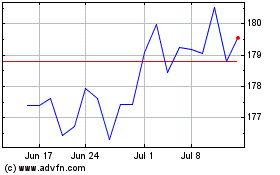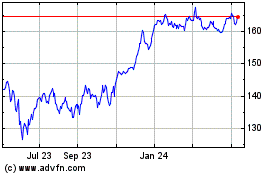In Sprint, T-Mobile Merger Talks, Power Shifts to a Familiar Agitator -- Update
June 14 2019 - 5:26PM
Dow Jones News
By Drew FitzGerald and Brent Kendall
As executives from T-Mobile US Inc. and Sprint Corp. work to
save their more than $26 billion merger, a familiar agitator is
looming ever larger over negotiations with the U.S. government.
Charlie Ergen, the billionaire executive chairman of Dish
Network Corp., has been trying to persuade antitrust enforcers the
deal is bad for competition. Now he is arguing the best way to
remedy that is to force the wireless companies to cast off more
assets, and his satellite-TV operator is leading the chase to
acquire them, people familiar with the matter said.
Mr. Ergen met jointly with Federal Communications Commission
Chairman Ajit Pai and Justice Department antitrust chief Makan
Delrahim this week and "explained the need for a minimum of four
nationwide mobile network operators," according to an FCC filing
posted Friday.
The deal earned the FCC chairman's blessing last month after the
merger partners agreed to divest of Sprint's Boost Mobile prepaid
brand and to invest in rural broadband. But the Justice Department
is still pushing the companies to shed more assets, such as
wireless spectrum licenses, and make other commitments that would
preserve competition in the cellular market, according to people
familiar with the talks.
Dish, which has amassed vast amounts of wireless spectrum that
it needs to put to use, is among the companies in the running to
become the fourth operator, people familiar with the matter said.
Other suitors include cable operators Charter Communications Inc.
and Altice USA Inc., the people said.
Mr. Ergen spent the better part of a decade in pursuit of other
telecom companies, joining talks to acquire MetroPCS, Clearwire and
DirecTV, among other firms. Those companies ultimately rejected his
overtures and joined T-Mobile, Sprint and AT&T Inc.,
respectively.
In 2013, he sought to buy Sprint. In 2015, he tried to buy
T-Mobile. Last year, he went after Sprint again.
The missed connections have given Mr. Ergen the reputation of
someone who "snatches defeat from the jaws of victory," New Street
Research analyst Jonathan Chaplin said.
"He's screwed it up for himself in the past by overplaying his
hand," Mr. Chaplin said, though he described Mr. Ergen as
"exceptionally bright and perfectly capable of extracting a good
deal for himself."
Sprint opted last year to instead join T-Mobile in an all-stock
deal that would leave the U.S. with three nationwide cellphone
carriers instead of four. The deal seeks economies of scale in a
mature U.S. wireless market dominated by Verizon Communications
Inc. and AT&T. Previous efforts, however, have been derailed by
antitrust concerns.
Mr. Ergen has long threatened to spoil the wireless deal. The
billionaire was among the deal's early opponents and has funded a
group of lawyers and economists who argue the transaction would
harm competition.
Dish doesn't offer cellphone service and doesn't directly
compete with either wireless carrier. The company is building a
bare-bones 5G network using spectrum it has amassed at auctions
over the past decade.
Its core business selling satellite-TV services has suffered as
customers defect. It lost nearly 1 million subscribers last year,
putting pressure on the business to diversify. Bundling cellphone
and satellite services could help Dish compete with cable providers
that can already sell broadband services.
The Englewood, Colo., company is wiring its cellular network
first for the Internet of Things market that includes vehicles,
sensors and other connected devices. The company hasn't identified
any major business customers for the network. It plans to later
upgrade that skeleton network through a second construction phase
to address a broader customer base in later years.
That strategy has put Dish in the crosshairs of FCC officials,
who are concerned that Mr. Ergen is squatting on valuable airwaves.
The agency last year warned the company that it could take away
some of its licenses unless it can credibly demonstrate it expects
to use them to serve customers.
Handing Dish a cellphone business could solve problems for
several parties. T-Mobile and Sprint would have all the federal
approvals they need to close their merger, a powerful weapon in
pending litigation against a group of Democratic state attorneys
general. The state officials broke with the Justice Department this
week and filed a lawsuit seeking to block the tie-up, arguing it
would raise prices and reduce innovation.
The divestiture would also let Mr. Ergen run a cellphone
business that satisfies FCC regulations. He has acknowledged that
his company doesn't have the capital it needs to finish its full
network.
"But that capital could come in many shapes and forms," Mr.
Ergen said last year during a conference call. "And like anything
else, when you have a really good business plan, you can find
partnerships and or capital to make those things happen."
Sarah Krouse contributed to this article.
Write to Drew FitzGerald at andrew.fitzgerald@wsj.com and Brent
Kendall at brent.kendall@wsj.com
(END) Dow Jones Newswires
June 14, 2019 17:11 ET (21:11 GMT)
Copyright (c) 2019 Dow Jones & Company, Inc.
T Mobile US (NASDAQ:TMUS)
Historical Stock Chart
From Mar 2024 to Apr 2024

T Mobile US (NASDAQ:TMUS)
Historical Stock Chart
From Apr 2023 to Apr 2024
